An Adult Daughter’s Thoughts about Growing up a Contractor's Child
 My dad asked me if I would write an article for him about the value of being raised as a contractor’s daughter, and how that might differ from other people’s experiences. I can’t actually imagine what it might be like to not be a contractor’s daughter. My childhood was filled with the smell of sawdust flying through the air, and classic rock crackling in from a dusty radio. Many of my earliest memories are of playing with my sister at the office around proudly branded displays of windows and shutters, and pretending to be mermaids in the basement storage. It shaped who I am.
My dad asked me if I would write an article for him about the value of being raised as a contractor’s daughter, and how that might differ from other people’s experiences. I can’t actually imagine what it might be like to not be a contractor’s daughter. My childhood was filled with the smell of sawdust flying through the air, and classic rock crackling in from a dusty radio. Many of my earliest memories are of playing with my sister at the office around proudly branded displays of windows and shutters, and pretending to be mermaids in the basement storage. It shaped who I am.
My ambitious driven father, tempered by my fiery compassionate mother, expertly juggled raising us and running the company. Custom Contracting was as much a home to us as any other; a spot where our family worked together towards earning our place in the world. It made our family unit a team capable of moving mountains.
 More than once I watched my father and his brothers build a house or barn. I cannot begin to describe to you the lingering feeling of awe which this type of undertaking inspires. With synchronicity honed their whole lives, they would take a wooded hill and a stack of reclaimed lumber, and create monoliths to my child’s eyes.
More than once I watched my father and his brothers build a house or barn. I cannot begin to describe to you the lingering feeling of awe which this type of undertaking inspires. With synchronicity honed their whole lives, they would take a wooded hill and a stack of reclaimed lumber, and create monoliths to my child’s eyes.
Not every moment was filled with awe and inspiration. My sister and I cleaned and helped renovate rental properties, we split hauled and stacked firewood, and we slaved through endless yard work. We hated (nearly) every minute of it. But we took great pride in our accomplishments, and the warmth of our house in the winter. I find that, as a young adult, I am not only more capable than my peers, I also believe myself more capable. I can hammer a nail and fix a sink better than most people I know, male or female. Because I am so confident in my abilities, I never think twice about taking on the world.
 As the dust settles on my wild adolescence I have carried with me a foundation of values on which to build my adult life. Now it seems I just can’t shake the need to buy my own house and some dirt to sit it on. I find that less and less of my down time is spent scrolling Facebook, and more and more is spent Googling the cost of putting in a septic system and what contributes to real estate values. As I drive down the street I find myself judging the quality of people’s roofs and cringing at water damage where proper gutter installation is begging to be.
As the dust settles on my wild adolescence I have carried with me a foundation of values on which to build my adult life. Now it seems I just can’t shake the need to buy my own house and some dirt to sit it on. I find that less and less of my down time is spent scrolling Facebook, and more and more is spent Googling the cost of putting in a septic system and what contributes to real estate values. As I drive down the street I find myself judging the quality of people’s roofs and cringing at water damage where proper gutter installation is begging to be.
So, I can’t imagine what life must be like for someone who was raised in world without wet paint and sawdust, without a family who builds monoliths and moves mountains, or without pride in the woodstove thawing my frozen fingers. I am defined by so many of these things. Being a contractor’s daughter created a world for me screaming with potential and teeming with possibilities, and a hard earned confidence to succeed at even my wildest dreams.
Guest Blogger: Kate McCadden is the oldest child in the McCadden family. She’s the one in the family with the creative artistic abilities. She is working on her career to become a writer and plans to get rich writing a book everyone will want to read.


 As I pointed out in
As I pointed out in 
 Personal qualities needed to be a Lead Carpenter
Personal qualities needed to be a Lead Carpenter
 Skilled Carpenters are assumed to have the trade skills needed to do the work at hand and to understand construction. But just because a carpenter has these skills doesn’t necessarily also mean he or she has the rest of what it takes to be a successful Lead Carpenter. Below is the first half of a list of key skills a carpenter should have or will need to acquire to become a great Lead Carpenter. I created this list to help carpenters and construction business owners improve their chances of success developing Lead Carpenters and a true Lead Carpenter System.
Skilled Carpenters are assumed to have the trade skills needed to do the work at hand and to understand construction. But just because a carpenter has these skills doesn’t necessarily also mean he or she has the rest of what it takes to be a successful Lead Carpenter. Below is the first half of a list of key skills a carpenter should have or will need to acquire to become a great Lead Carpenter. I created this list to help carpenters and construction business owners improve their chances of success developing Lead Carpenters and a true Lead Carpenter System. 
 Speaking: Ability to speak clearly including selecting language, tone of voice, and gestures appropriate to a specific audience.
Speaking: Ability to speak clearly including selecting language, tone of voice, and gestures appropriate to a specific audience. Creative Thinking: Has the ability and is not afraid to use imagination freely to combine ideas or information in new ways. Can easily make connections between ideas that seem unrelated to others.
Creative Thinking: Has the ability and is not afraid to use imagination freely to combine ideas or information in new ways. Can easily make connections between ideas that seem unrelated to others. One of my goals when working with my contractor coaching clients is to offer them new ways of looking at and doing things than they may have already experienced in the past. At this time of the year we debrief how well they did last year putting changes in place. Our interactions typical include review, celebration, planning and commitments. Using this process proves to be very rewarding for them, and for me as well.
One of my goals when working with my contractor coaching clients is to offer them new ways of looking at and doing things than they may have already experienced in the past. At this time of the year we debrief how well they did last year putting changes in place. Our interactions typical include review, celebration, planning and commitments. Using this process proves to be very rewarding for them, and for me as well. First they share with me their excitement about their personal and professional progress, and how much more time they have to work on their business, not just in it.
First they share with me their excitement about their personal and professional progress, and how much more time they have to work on their business, not just in it. “Before, when I was working with other people, I felt like I was on a trampoline. Now, when I work with you Shawn, I feel like I’m on a concrete floor.”
“Before, when I was working with other people, I felt like I was on a trampoline. Now, when I work with you Shawn, I feel like I’m on a concrete floor.”

 This stage of business growth is what I refer to as the “Take-Off Stage” for a remodeling business because either the business takes off successfully, or it doesn’t. Another way of looking at it might be either the business owner commits to doing it and doing it right, or accepts the status quo of accidental and unplanned growth.
This stage of business growth is what I refer to as the “Take-Off Stage” for a remodeling business because either the business takes off successfully, or it doesn’t. Another way of looking at it might be either the business owner commits to doing it and doing it right, or accepts the status quo of accidental and unplanned growth. Through experience an advanced
Through experience an advanced 
 To make sure you will get a return on investment make sure you and your coach agree on how you will measure results. Help with soft skills like leadership and people skills will be challenging to measure because changes and results may be seen as subjective and might be measured differently by different people. However many changes can be measured in an objective way. For example when I was first growing my business I worked with a coach on a financial system and the related QuickBooks setup required to support it. Although he seemed to have the right experience he couldn’t offer me a reference specifically from a construction company. After some discussion we agreed his compensation would be conditional on results and we made a list of desired outcomes to measure. After several months we mutually agreed his system didn't serve the intended purpose and I got the majority of my money back. Unfortunately I lost a lot of valuable time. I assume he did too. However we both learned a lot from the experience, I minimized my risk by agreeing on how he would be compensated, and I still had the money I needed to hire another expert to get it done.
To make sure you will get a return on investment make sure you and your coach agree on how you will measure results. Help with soft skills like leadership and people skills will be challenging to measure because changes and results may be seen as subjective and might be measured differently by different people. However many changes can be measured in an objective way. For example when I was first growing my business I worked with a coach on a financial system and the related QuickBooks setup required to support it. Although he seemed to have the right experience he couldn’t offer me a reference specifically from a construction company. After some discussion we agreed his compensation would be conditional on results and we made a list of desired outcomes to measure. After several months we mutually agreed his system didn't serve the intended purpose and I got the majority of my money back. Unfortunately I lost a lot of valuable time. I assume he did too. However we both learned a lot from the experience, I minimized my risk by agreeing on how he would be compensated, and I still had the money I needed to hire another expert to get it done. In addition to working one on one with remodeling businesses and their owners I have also worked in the corporate side of franchising. Joining a franchise can be a great option for the right business owner. For example, if you’re an entrepreneur who wants to carve out your own path and direction and evolve your business systems on the fly a franchise might not be a good option. On the other hand if your just getting started, or need to tear down what you have and start over again, and you want to adopt an established and tested business model, and you are willing to actually follow it, not question it, a franchise can be a great way to go.
In addition to working one on one with remodeling businesses and their owners I have also worked in the corporate side of franchising. Joining a franchise can be a great option for the right business owner. For example, if you’re an entrepreneur who wants to carve out your own path and direction and evolve your business systems on the fly a franchise might not be a good option. On the other hand if your just getting started, or need to tear down what you have and start over again, and you want to adopt an established and tested business model, and you are willing to actually follow it, not question it, a franchise can be a great way to go. 
 If contractors knew how to prepare for this recession, they would have been ready for it and the actual impact wouldn’t have been as dramatic on their businesses. Knowing what you now know, use the lessons learned to better predict and deal with the next recession. Also, start thinking about where you want you and your business to be in the future. Be proactive and create a plan, don't wait to see what happens and where you end up. Rather than do it on your own consider finding a mentor with a track record of success, someone who can help you and will invest the time required to understand you and your business and will invest in you.
If contractors knew how to prepare for this recession, they would have been ready for it and the actual impact wouldn’t have been as dramatic on their businesses. Knowing what you now know, use the lessons learned to better predict and deal with the next recession. Also, start thinking about where you want you and your business to be in the future. Be proactive and create a plan, don't wait to see what happens and where you end up. Rather than do it on your own consider finding a mentor with a track record of success, someone who can help you and will invest the time required to understand you and your business and will invest in you. 

 Many coaches can help a variety of business types in different industries. For example I worked with a business coach many years back who had never owned or worked in a remodeling business, but that guy sure knew how to help me assess and improve my marketing. With his help we accomplished my goal of changing my business’ customer and job types so I could increase my margins. On the other hand I worked with another coach to help me with improving my business’ financial system. He was a smart guy, and knew his accounting, but I eventually figured out he had no exposure or experience with how a small construction business needs to do accurate job costing. After a lot of lost time and money I found a new coach to work with who had remodeling industry experience and the difference was night and day.
Many coaches can help a variety of business types in different industries. For example I worked with a business coach many years back who had never owned or worked in a remodeling business, but that guy sure knew how to help me assess and improve my marketing. With his help we accomplished my goal of changing my business’ customer and job types so I could increase my margins. On the other hand I worked with another coach to help me with improving my business’ financial system. He was a smart guy, and knew his accounting, but I eventually figured out he had no exposure or experience with how a small construction business needs to do accurate job costing. After a lot of lost time and money I found a new coach to work with who had remodeling industry experience and the difference was night and day. Second, the right mentor will be empathetic, not sympathetic. By that I mean the mentor will not take on your problems for you, rather he or she will help you wrap your head around what you need to think about and do so you can solve them yourself. And, the right mentor will help you anticipate the emotional and personal challenges you might experience making the changes. One example might be helping you figure out how to appropriately tell a long term employee you have to let him go for poor performance, without hurting his feelings more than needed and or triggering a law suit. Another might be how to diplomatically deal with an irate client after your roofing sub’s tarp blew off in a thunderstorm last night and ruined every ceiling in the house (happened to me). Essentially, it’s the mentor’s role is to socialize the mentee into his or her role and help avoid learning from the lumberyard school of hard knocks.
Second, the right mentor will be empathetic, not sympathetic. By that I mean the mentor will not take on your problems for you, rather he or she will help you wrap your head around what you need to think about and do so you can solve them yourself. And, the right mentor will help you anticipate the emotional and personal challenges you might experience making the changes. One example might be helping you figure out how to appropriately tell a long term employee you have to let him go for poor performance, without hurting his feelings more than needed and or triggering a law suit. Another might be how to diplomatically deal with an irate client after your roofing sub’s tarp blew off in a thunderstorm last night and ruined every ceiling in the house (happened to me). Essentially, it’s the mentor’s role is to socialize the mentee into his or her role and help avoid learning from the lumberyard school of hard knocks.  One last thought: Maybe you want both in one person
One last thought: Maybe you want both in one person
 Hiring a construction or remodeling industry expert certainly can be expensive. Depending on the nature of the problems to be addressed the fees can add up quickly. However, compared to the money lost over time by not correcting or improving things that slow you down or increase project costs, years perhaps, the lost revenue and compromised profitability can far exceed the initial cost to fix the problem. Perhaps you could help your boss see the cost as an investment. To do this consider using a simple analogy from your world as an example to help get your intended point across. Maybe consider using the example of having a table saw. Sure you could do your job without one, but it sure would go a lot faster and come out a lot better, and at a much lower labor cost, if he made the investment in a good one sooner than later. And by doing so the labor savings alone would quickly cover the cost of buying the table saw.
Hiring a construction or remodeling industry expert certainly can be expensive. Depending on the nature of the problems to be addressed the fees can add up quickly. However, compared to the money lost over time by not correcting or improving things that slow you down or increase project costs, years perhaps, the lost revenue and compromised profitability can far exceed the initial cost to fix the problem. Perhaps you could help your boss see the cost as an investment. To do this consider using a simple analogy from your world as an example to help get your intended point across. Maybe consider using the example of having a table saw. Sure you could do your job without one, but it sure would go a lot faster and come out a lot better, and at a much lower labor cost, if he made the investment in a good one sooner than later. And by doing so the labor savings alone would quickly cover the cost of buying the table saw.  If you hear that objection it may be the truth. But you know what they say about the definition of insanity. Depending on your relationship with your boss perhaps you could ask what he has already done or will do different to get that profitable job. The positive news is that often times the business is actually already in pretty good condition. I find many construction businesses might only need a few tweaks and or new processes to make significant improvements. If the expert helps start with low hanging fruit the initial changes can often generate the additional money needed to finance additional changes.
If you hear that objection it may be the truth. But you know what they say about the definition of insanity. Depending on your relationship with your boss perhaps you could ask what he has already done or will do different to get that profitable job. The positive news is that often times the business is actually already in pretty good condition. I find many construction businesses might only need a few tweaks and or new processes to make significant improvements. If the expert helps start with low hanging fruit the initial changes can often generate the additional money needed to finance additional changes. Most construction business owners are thoughtful and kind people. They are also typically very busy and put in a lot of hours to help keep the business going and keep the employees working. If you see things that your boss doesn't, keep these considerations in mind. Choose a good time to share your opinions and offer your suggestions. Most importantly, do it with good intention and respect. I hope you have a boss who is willing to listen and will hear your suggestions.
Most construction business owners are thoughtful and kind people. They are also typically very busy and put in a lot of hours to help keep the business going and keep the employees working. If you see things that your boss doesn't, keep these considerations in mind. Choose a good time to share your opinions and offer your suggestions. Most importantly, do it with good intention and respect. I hope you have a boss who is willing to listen and will hear your suggestions. 
 Hire and properly train employees before you already need them and their required skills up and running.
Hire and properly train employees before you already need them and their required skills up and running.  Before you actually increase your overhead costs test the marketplace you plan to work in to make sure you can sell at the increased pricing you'll need and can sell enough work at that price. Consider if you are in the right market to do business but also if you have the right marketing and sales skills in place.
Before you actually increase your overhead costs test the marketplace you plan to work in to make sure you can sell at the increased pricing you'll need and can sell enough work at that price. Consider if you are in the right market to do business but also if you have the right marketing and sales skills in place.







